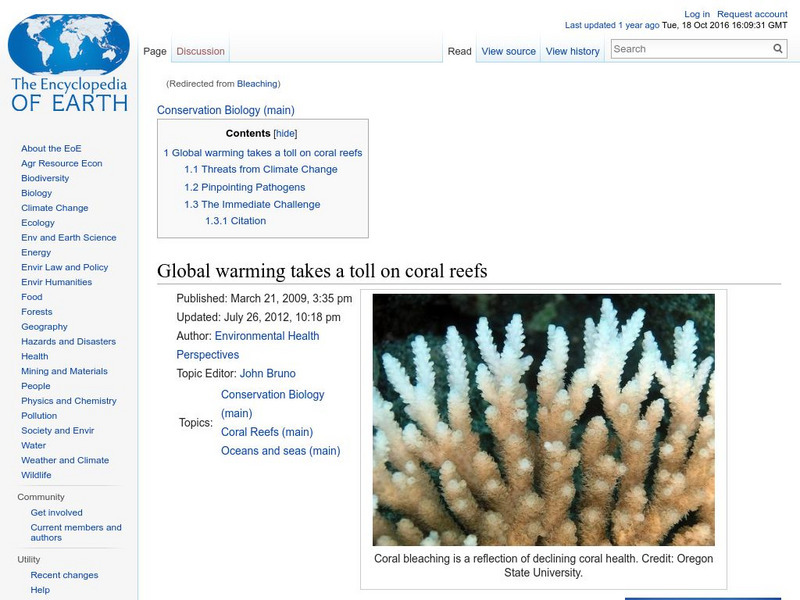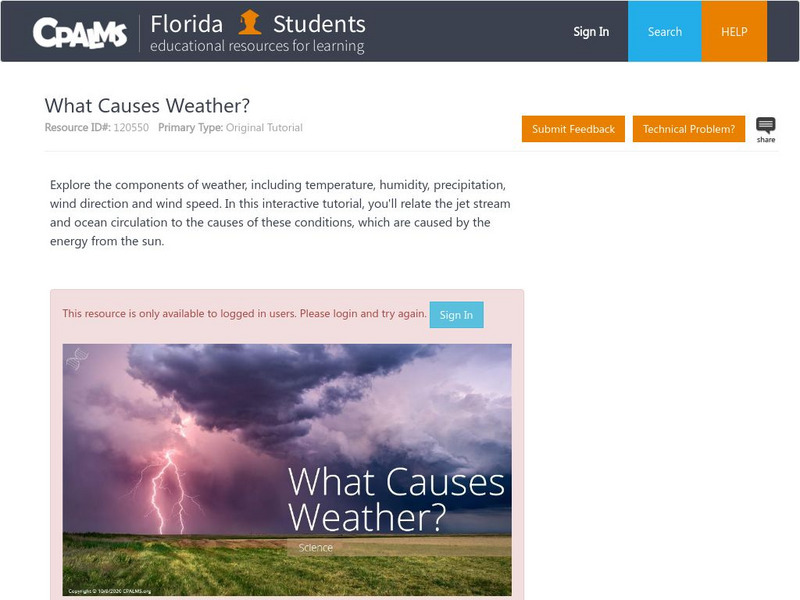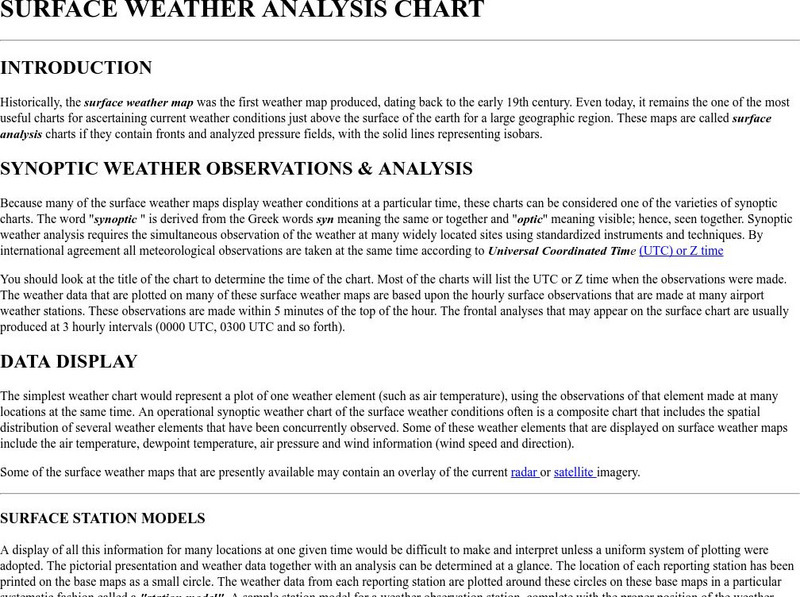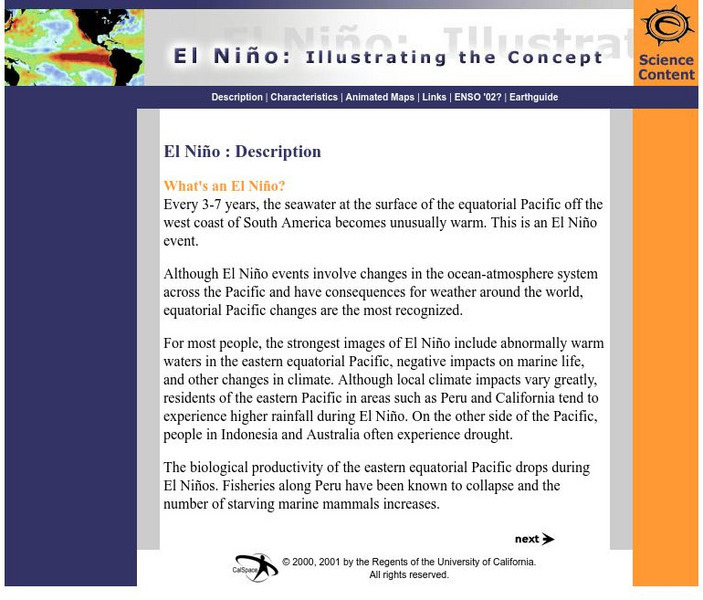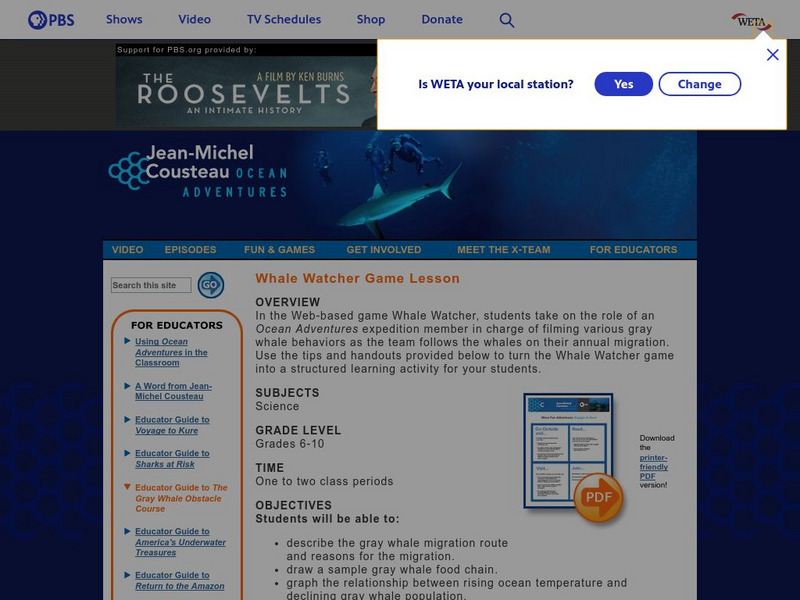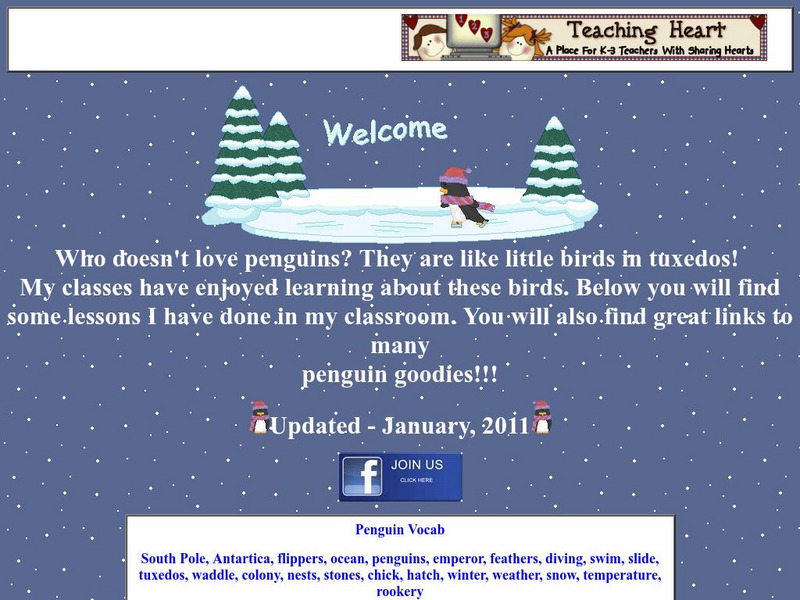Encyclopedia of Earth
Encyclopedia of Earth: Global Warming Takes a Toll on Coral Reefs
Article describing damage caused to coral reefs in the Caribbean after an extended period of extreme heat in 2005 that raised the ocean temperature in that area. The potential, devastating consequences to humans of coral reef destruction...
NASA
Jet Propulsion Laboratory: Global Climate Change: Sea Level Viewer
This viewer allows you to see ocean heat storage from space. These images indicate sea surface heights. Learn more about El Nino and La Nina and how they have profound effects on world climate.
CPALMS
Florida State University Cpalms: Florida Students: What Causes Weather?
Determine parameters of weather; including specifically temperature, humidity, precipitation, wind direction and wind speed in this tutorial. During this tutorial, you will relate the jet stream and ocean circulation to the causes of...
National Geographic
National Geographic: Sources, Sinks, and Feedbacks
Students will learn about how the Earth's carbon cycle works, as they examine the relationship between levels of carbon dioxide and water vapor in the atmosphere and the temperature of the ocean's surface. Includes online student...
Scholastic
Scholastic: Study Jams! Science: Earth's Oceans
Oceans contain 97% of the water on the Earth and are home to a huge number of living creatures. View an informative slideshow of the ocean and its inhabitants and then test yourself on what you learned.
Other
Tech Learning: Students Examine Bio Diversity Nov. 2003
Read about the use of data loggers in one high school class. The data loggers were the key to quantifying the relationship between temperature, light, and biodiversity. Although this is relevant to high school science links are provided...
University of Wisconsin
Atmospheric and Oceanic Sciences: Surface Weather Analysis
Explains the use of synoptic weather analysis in preparing weather maps and forecasting. Discusses the use of symbols as well.
Georgia Department of Education
Ga Virtual Learning: Weather and Climate
In this amazingly comprehensive interactive tutorial you will learn how factors such as ocean currents, topography, and air currents affect weather patterns. You will also learn the similarities and differences between weather and climate.
University Corporation for Atmospheric Research
Ucar: What Do Soda and the Oceans Have in Common?
Students will use soda to explore how carbon dioxide is able to dissolve into liquid. They will learn about Henry's law, which describes how the solubility of gas into liquids is dependent on temperature and develop hypotheses about how...
NOAA
Noaa: Global Monsoons
This interactive world map allows you to view factors associated with monsoons. Monsoon data displayed includes factors such as precipitation, wind speed, soil moisture, and ocean temperatures. Links to monsoons associated with specific...
Curated OER
Ocean
Discover more about the underocean environment at this site that surveys animals, environmental factors such as light and temperature, currents, animals, plants, and the like.
Curated OER
Etc: Maps Etc: Mean Average Temperatures in North America, 1906
A map from 1906 of North America showing the mean annual isotherms of the region given in degrees Fahrenheit. "The climate of North America naturally varies greatly, depending on latitude, the general atmospheric circulation or direction...
HotChalk
Hot Chalk: Lesson Plans Page: Ocean Unit Introduction
This lesson will introduce young students to oceans by looking at the animals, plants and water temperatures for different oceans.
Center for Innovation in Engineering and Science Education, Stevens Institute of Technology
Ciese: K 12 Education Curriculum: Online Classroom Projects
This site presents projects for individual classrooms and collaborative projects that can be done with other classes or schools. Most of these are science projects.
PBS
Pbs: El Nino
You can link to the anatomy of El Nino, chasing El Nino, and El Nino's reach. There is a resource page and a search page.
Wikimedia
Wikipedia: Bathyal Zone
Learn where this ocean zone is located, average temperature and the unique traits of the animals that reside there.
PBS
Quest: Evidence of Global Warming
Explore how rising sea levels and temperatures, increases in ocean heat, and melting glaciers support global warming in this interactive.
University Corporation for Atmospheric Research
Ucar: Make a Hurricane
The temperature of the sea, moisture in the air, and high winds all play a role in making a hurricane stronger or weaker. Drag the hurricane over the ocean to see what happens.
University of California
Earthguide: El Nino: Illustrating the Concept
Do you know what happens during a typical El Nino? This overview provides a description, characteristics, and animated maps showing sea surface temperature changes during past El Nino events.
PBS
Pbs Teachers: Whale Watcher Game Lesson
Describe the gray whale migration route and graph reasons for the migration. Predict what would happen to gray whales if they did not exhibit certain behaviors. This site also contains an interactive game.
University Corporation for Atmospheric Research
Ucar: Sea Ice and Heat: A Vicious Cycle
Melting sea ice doesn't cause sea level to rise because the ice is already in the ocean, but it does cause other changes to the planet. When sea ice melts, more sunlight is absorbed by the Earth, which causes more warming. It's a vicious...
NOAA
Noaa: Cpc: Weekly Enso Update
Weekly updates on data collected and analyzed by the Climate Prediction Center. Includes sea surface temperature, subsurface tropical Pacific analyses and much more. Extensive site: check it out!
Other
Teaching Heart: Penguins
Use this site if you want to find ideas, lessons and activities related to penguins.
Curated OER
Coral Reef
Discover more about the underocean environment at this site that surveys animals, environmental factors such as light and temperature, currents, animals, plants, and the like.


